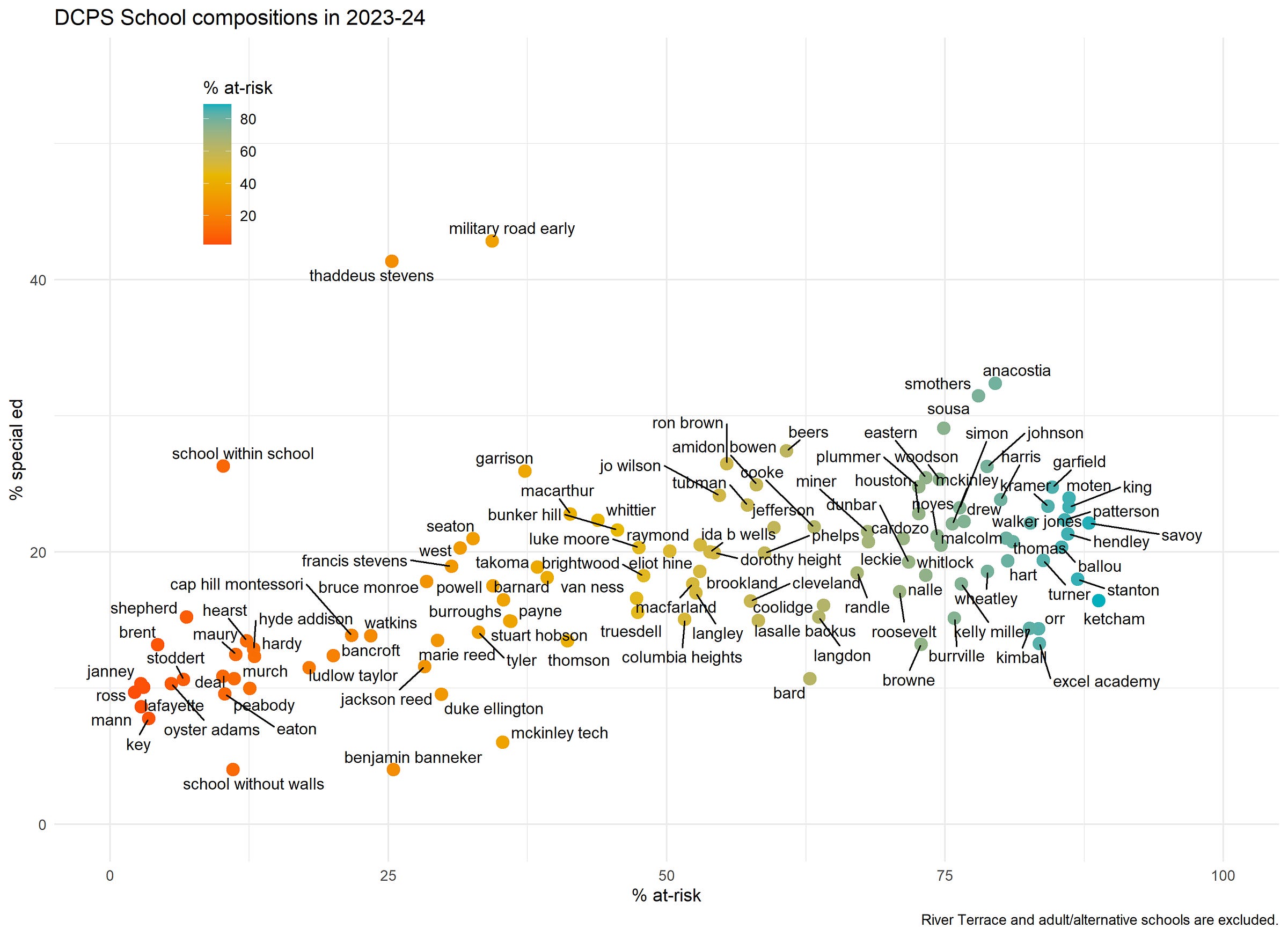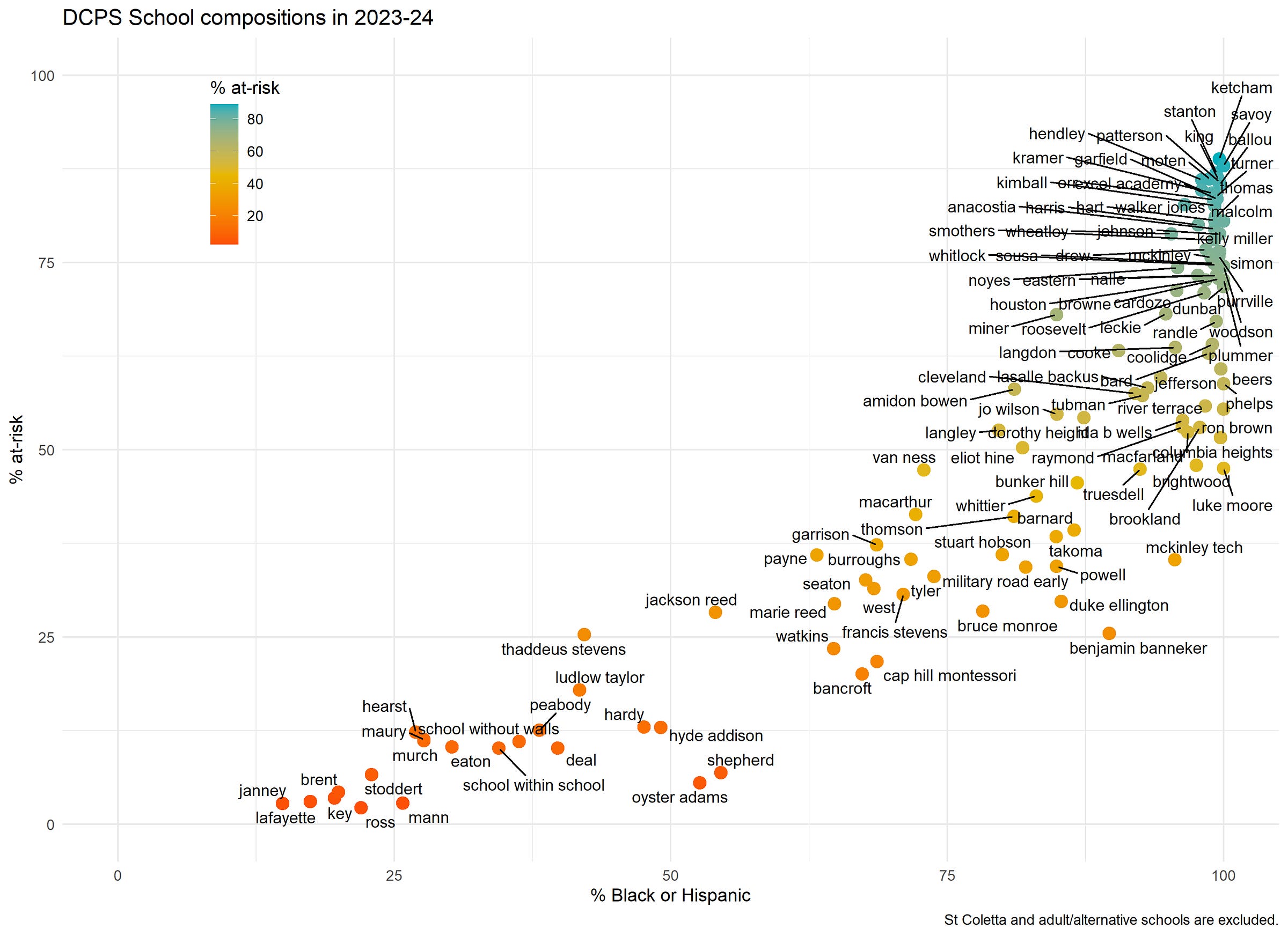BASIS's Proposed Expansion
More screaming into the void
Next week, the DC Public School Charter Board (PCSB) will discuss BASIS’s proposal to expand to grades K–12 and almost double in enrollment over time. BASIS currently serves grades 5-12. I typically stay out of charter opening and expansion discussions, but the BASIS expansion is one for which I’ll scream into the void.
For me, the question is not about who BASIS wants to serve, but rather, who BASIS does NOT want to serve. BASIS has some of the lowest percentages of “at-risk”, special education, and English learner students among all schools in the city, and the lowest percentages among all charter schools. As point of comparison, BASIS served 9% “at-risk” students, 2% English learners, and 9% special education students in 2023-24 while the average DC public school served 53% “at-risk” students, 11% English learners, and 19% special education students. BASIS’s many claims about the high “quality” of the school as demonstrated by high test scores are also hard to swallow in light of WHO BASIS serves and the strong relationship between income and student proficiency rates in DC.
BASIS had the opportunity to diversify their student population in the first year of the equitable access lottery preference, but they declined to participate. They did participate in the second year of the equitable access lottery preference for the 2024-25 school year, presumably in preparation for the discussion on the merits of their expansion. Yet they allocated only 6% of their seats for the equitable access preference. It’s like telling us that they didn’t really want to participate in the equitable access preference without having to say that out loud.
BASIS is known among (some) parents as being a school for academically-driven students. But BASIS is not universally known or discussed among DC parent communities. As the co-math team coach at my kid’s school, I can tell you that which families applied to or didn’t apply to BASIS was predictable along racial and class lines and was not just about ability. And why would all DC parents be knowledgeable about BASIS when, currently, BASIS accepts only 5th grade students, and 5th grade is not a transition year for the DCPS neighborhood school system? But don’t take my word for it. In a survey commissioned by BASIS gauging parental demand and interest, the best predictor of interest in BASIS was parental education attainment, specifically parents with advanced degrees “who are seeking K-12 schools that will set their children up for similar future academic success” (p. 14). I also think that some families may not choose BASIS even if they knew of the option because belonging is multi-faceted, and parents want their children to be in a school where they will feel loved and accepted. Will they get that at BASIS, given the lack of socio-economic diversity and the up and out model, where so many students leave or are pushed out each year?
Whether BASIS should be allowed to expand is fundamentally a question of values. Further advantage the advantaged, or serve the common good? The problem is, in part, resource allocation. The extent to which elite families choose BASIS over neighborhood options means lower enrollment and less funding in neighborhood schools, which must serve all students, including those academically-motivated and those who need more support. BASIS’s own application cites decreased birth rates and projected limited population growth in DC, which means the competition for students and funding is a zero-sum game. To make matters worse, BASIS fundraises and annually receives an insane amount of donations ($700,000 in one year), which makes it even more of an uneven playing field.
Sorting based on racial and economic lines also leads to worse school segregation and less integration, and BASIS already serves the lowest percentage of Black and Hispanic students among all charter schools in DC. School segregation leads to inequitable sorting of resources, both financial but also in terms of manpower. For example, segregation leads to an abundance of parent volunteer power in some schools and in dearth in others.
I am not naïve enough to think that if the BASIS’s of the world did not exist, elite parents would always choose to send their kids to neighborhood schools. I know they would find other options if they wanted to, like paying for private school or moving out of DC. But I still have to ask whether the public systems that are paid for with public tax dollars should be allowed to do this. I believe that public systems should serve the common good.
If BASIS really wanted to serve DC students beyond children of parents with advanced degrees, they would have:
Changed the entry year to align with DCPS so that a more diverse group of parents would be more aware of the school
Set aside a representative (or even reasonable) share of seats for students in various groups, like those classified as “at-risk” by DC or special education
Worked to retain their students and their families over time
But they didn’t do any of these things. Setting aside only 6% of their seats for “at-risk” students who comprise the *majority* of DC’s public school population means that BASIS doesn’t want to serve the *majority* of DC students. And if BASIS doesn’t want to serve the majority of DC students, they shouldn’t get more public resources in the name of serving DC students. Would the DC PCSB approve their expansion if BASIS stated, we’re here to serve children of parents with advanced degrees? I guess we’ll find out because even though no one will say that out loud, it doesn’t make it any less true.







Well, this is all true. For me, the issue is less "sorting based on racial and economic lines also leads to worse school segregation and less integration" and more that DC officials are actually knowledgable about and responsible for this state of affairs. In the guise of expanded "choice," DC has allowed this segregated PUBLICLY FUNDED system (and school) to thrive all the while KNOWING that it is segregated and that its promotion contributes to more segregation. The US dept. of ed has repeatedly taken on cases around civil rights violations at BASIS DC. The support of DC officials in the face of that and the clearly stated intent of differentiation by this school makes me wonder if a lawsuit against DC is also in order.